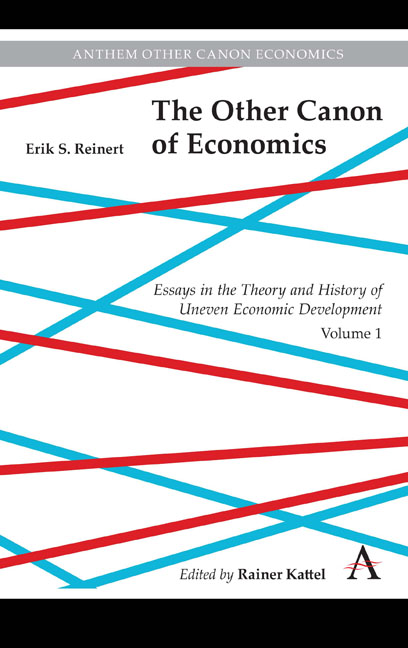Book contents
- Frontmatter
- Dedication
- Contents
- Introduction
- Chapter 1 Catching-up from Way Behind. A Third World Perspective on First World History
- Chapter 2 Recent Trends in Economic Theory — Implications for Development Geography
- Chapter 3 A Schumpeterian Theory of Underdevelopment - A Contradiction in Terms?
- Chapter 4 Competitiveness and Its Predecessors - A 500-Year Cross-national Perspective
- Chapter 5 Diminishing Returns and Economic Sustainability: The Dilemma of Resource-based Economies under a Free Trade Regime
- Chapter 6 Economics: ‘The Dismal Science’ or ‘The Never-ending Frontier of Knowledge’? On Technology, Energy and Economic Welfare
- Chapter 7 Production Capitalism vs. Financial Capitalism – Symbiosis and Parasitism. An Evolutionary Perspective and Bibliography
- Chapter 8 Globalization in the Periphery as a Morgenthau Plan: The Underdevelopment of Mongolia in the 1990s
- Chapter 9 Increasing Poverty in a Globalized World: Marshall Plans and Morgenthau Plans as Mechanisms of Polarization of World Incomes
- Chapter 10 An Early National Innovation System: The Case of Antonio Serra’s 1613 Breve Trattato
- Chapter 11 Innovation Systems of the Past: Modern Nation-States in a Historical Perspective. The Role of Innovations and of Systemic Effects in Economic Thought and Policy
- Chapter 12 The Other Canon: The History of Renaissance Economics
- Chapter 13 Benchmarking Success: The Dutch Republic (1500–1750) as Seen by Contemporary European Economists
- Chapter 14 Mercantilism and Economic Development: Schumpeterian Dynamics, Institution Building and International Benchmarking
- Chapter 15 Development and Social Goals: Balancing Aid and Development to Prevent ‘Welfare Colonialism’
Chapter 1 - Catching-up from Way Behind. A Third World Perspective on First World History
Published online by Cambridge University Press: 13 April 2024
- Frontmatter
- Dedication
- Contents
- Introduction
- Chapter 1 Catching-up from Way Behind. A Third World Perspective on First World History
- Chapter 2 Recent Trends in Economic Theory — Implications for Development Geography
- Chapter 3 A Schumpeterian Theory of Underdevelopment - A Contradiction in Terms?
- Chapter 4 Competitiveness and Its Predecessors - A 500-Year Cross-national Perspective
- Chapter 5 Diminishing Returns and Economic Sustainability: The Dilemma of Resource-based Economies under a Free Trade Regime
- Chapter 6 Economics: ‘The Dismal Science’ or ‘The Never-ending Frontier of Knowledge’? On Technology, Energy and Economic Welfare
- Chapter 7 Production Capitalism vs. Financial Capitalism – Symbiosis and Parasitism. An Evolutionary Perspective and Bibliography
- Chapter 8 Globalization in the Periphery as a Morgenthau Plan: The Underdevelopment of Mongolia in the 1990s
- Chapter 9 Increasing Poverty in a Globalized World: Marshall Plans and Morgenthau Plans as Mechanisms of Polarization of World Incomes
- Chapter 10 An Early National Innovation System: The Case of Antonio Serra’s 1613 Breve Trattato
- Chapter 11 Innovation Systems of the Past: Modern Nation-States in a Historical Perspective. The Role of Innovations and of Systemic Effects in Economic Thought and Policy
- Chapter 12 The Other Canon: The History of Renaissance Economics
- Chapter 13 Benchmarking Success: The Dutch Republic (1500–1750) as Seen by Contemporary European Economists
- Chapter 14 Mercantilism and Economic Development: Schumpeterian Dynamics, Institution Building and International Benchmarking
- Chapter 15 Development and Social Goals: Balancing Aid and Development to Prevent ‘Welfare Colonialism’
Summary
Schumpeter once said that ‘the upper strata of society are like hotels which are … always full of people, but people who are forever changing’ (Schumpeter 1934: 156). It is tempting to use the same metaphor on nations. Taking a long view, many nations have in sequence joined the upper strata hotel: Britain, the United States, Germany, Japan and others. Once there, however, they have tended to stay. The country occupying the best suites has changed, but all who ever moved into the hotel, still – compared to the Third World – ‘constitute “the rich”, a class … who are removed from life's battles’, to continue quoting Schumpeter on this issue (Schumpeter 1934: 156). These countries, however, are the home of only a minority of the world population.
The last 10 years have brought about a changing perspective on how economic growth actually happens. This improved understanding, however, has mainly evolved around the countries which are already living in Schumpeter's upper strata hotel – the Triad of Europe, Japan and the United States. In this chapter I shall mentally leave this hotel, and see the world from the Third World point of view. Unfortunately, the focus on the upper strata is somewhat in the spirit of the master himself. Schumpeter's own aristocratic manners, habits and tastes were not exactly compatible with viewing the world from the point of view of the ‘losers’ or laggards.
There is a second, and, less obvious, reason for studying the problems of the Third World. Understanding underdevelopment in the Third World can contribute effectively to a better understanding of the growth process in the industrialized countries. The economic problems of the industrialized world give weak and unclear symptoms, much in the same way that early stages of an illness produce general and unspecific symptoms: a fever or a headache. As the illness advances – as the patient gets sicker – stronger and more specific symptoms appear, making a diagnosis possible. My contention is that the study of the economically very sick nations can significantly contribute to the understanding of the developed world, for example the European Community running a slight fever.
- Type
- Chapter
- Information
- The Other Canon of EconomicsEssays in the Theory and History of Uneven Economic Development, pp. 19 - 44Publisher: Anthem PressPrint publication year: 2024

